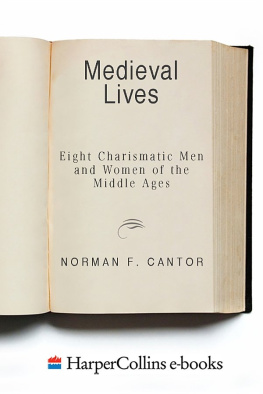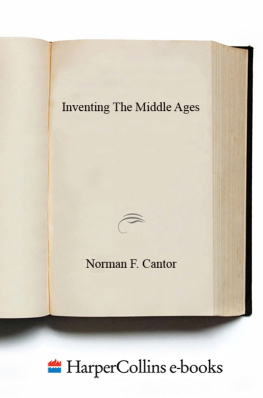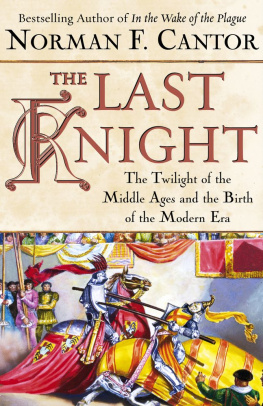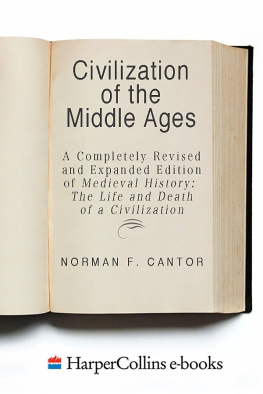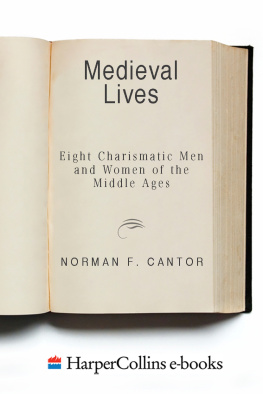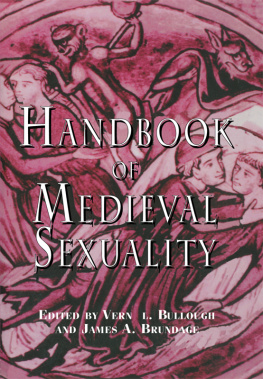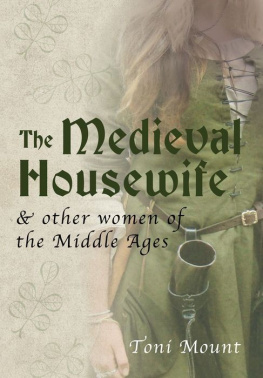Norman F. Cantor - Medieval Lives : Eight Charismatic Men and Women of the Middle Ages
Here you can read online Norman F. Cantor - Medieval Lives : Eight Charismatic Men and Women of the Middle Ages full text of the book (entire story) in english for free. Download pdf and epub, get meaning, cover and reviews about this ebook. City: New York, year: 2015, publisher: Harper Perennial, genre: History. Description of the work, (preface) as well as reviews are available. Best literature library LitArk.com created for fans of good reading and offers a wide selection of genres:
Romance novel
Science fiction
Adventure
Detective
Science
History
Home and family
Prose
Art
Politics
Computer
Non-fiction
Religion
Business
Children
Humor
Choose a favorite category and find really read worthwhile books. Enjoy immersion in the world of imagination, feel the emotions of the characters or learn something new for yourself, make an fascinating discovery.
- Book:Medieval Lives : Eight Charismatic Men and Women of the Middle Ages
- Author:
- Publisher:Harper Perennial
- Genre:
- Year:2015
- City:New York
- Rating:5 / 5
- Favourites:Add to favourites
- Your mark:
- 100
- 1
- 2
- 3
- 4
- 5
Medieval Lives : Eight Charismatic Men and Women of the Middle Ages: summary, description and annotation
We offer to read an annotation, description, summary or preface (depends on what the author of the book "Medieval Lives : Eight Charismatic Men and Women of the Middle Ages" wrote himself). If you haven't found the necessary information about the book — write in the comments, we will try to find it.
Medieval Lives : Eight Charismatic Men and Women of the Middle Ages — read online for free the complete book (whole text) full work
Below is the text of the book, divided by pages. System saving the place of the last page read, allows you to conveniently read the book "Medieval Lives : Eight Charismatic Men and Women of the Middle Ages" online for free, without having to search again every time where you left off. Put a bookmark, and you can go to the page where you finished reading at any time.
Font size:
Interval:
Bookmark:
To Mindy

CREDO
We can look forward... as youths, to being grown up... to reaching our prime, and in our prime, to growing old.... Whether this will happen is uncertain; but there is always something to look forward to.
AUGUSTINE OF HIPPO, ALGERIA, FIFTH CENTURY (TRANS. PETER BROWN)
I, flaming Life of the divine substance, flare up above the beauty of the plains, I shine in the waters and blaze in the sun, the moon, and the stars, and with an airy wind, as if by an invisible life which sustains the whole, I arouse all things to life.... And so I, the fiery power, lie hidden in these things, and they themselves burn by me, as the breath unceasingly moves the man, like windy flames in a fire... I am Life whole and entire;... all that is living is rooted in me. For Reason is the root and in it blossoms the resounding Word.
HILDEGARD OF BINGEN, GERMANY, TWELFTH CENTURY (TRANS. KENT KRAFT)

CONTENTS
Almost seven decades have passed since a brilliant young don at Girton College, Cambridge, Eileen Power, published Medieval People, a collection of biographies of six medieval men and women. Their lives fell within the time span from the ninth to fifteenth centuries. Powers biographies were short and beautifully written, and were intended for the general reader and the student.
Powers book is still in print, having gone through innumerable printings. Its current American publisher, HarperCollins, invited me to try my hand at writing a book similar to Powers in scope and format, and this book is the result.
I have written herein about eight medieval men and women. The time span covered is between the fourth and fifteenth centuries. The biographies are short and the book is addressed to the lay reader and the college student.
Otherwise Powers classic work and this book are different in important ways. Power was a social and economic historian; my interest is primarily in cultural and intellectual history. Powers book is marked by a wonderful freshness and naivete, an irresistible British 1920s medievalist enthusiasm that I cannot quite share. My Middle Ages are both a more complex and sadder place than Powers. It is not entirely to my advantage that I take cognizance of the vast amount of research and publication on the Middle Ages during the past seven decades. Of the forty-five works listed in my bibliography (a highly selective listing), only one would have been available to Power. It is astonishing and to her great credit as a scholar and writer that a set of medieval biographies written before the mass of modern scholarship on the Middle Ages was published should still be compelling and very much worth reading. On the other hand, in the light of all this learning about the Middle Ages, mine is inevitably a different perception of the medieval world from hers in some significant ways.
These differences can be summed up by saying that Powers medieval people seem a generally contented lot, usually happy with themselves and not oppressed by their environment. My eight people are normally anxious, conflicted, and under stress. That I have chosen to write about people from the elitecharismatic personalities among the ruling classwho were therefore burdened by the cares of leadership, whereas Powers people were more middle and working class, partly accounts for this difference, but not completely.
I also think that the messages of modern psychotherapy have affected me in perceiving my people as placed in critical junctures and facing hard decisions. Power was a marvelously insightful person, but the worlds of Cambridge in the early 1920s and New York in the 1990s are very different ambiences, and these differences are reflected in our perceptions of how people think and behave, in the Middle Ages as well as today.
Power was a forerunner of the social history focus that rose with the French Annales school in the 1930s and 1940s and reached its zenith among many American medievalists in the 1970s and 1980s. My book has the character of a countercyclical enterprise. I appreciate what Power, the Annalists, and their successors have done to explore the dimensions of medieval society, and I have learned much from them that I have used in this book, particularly with regard to scene-setting. But I also believe that the great issues and themes of the medieval world still lie within the parameters of church and state, as did so many historians who wrote during the classical era of medievalist scholarship between 1895 and 1965. This conviction shapes this book as it did my recent works, The Civilization of the Middle Ages (HarperCollins, 1993) and Inventing the Middle Ages (Morrow, 1991; Lutterworth, 1992; Quill, 1993).
A generation of American medieval historians became committed to the social history approach they learned from the Parisian Annalists and which Eileen Power can be said to have anticipated in her classic book on Medieval People of 1924. Partly for ideological reasons, the social historians gained hegemony in the academic profession, but there was always a systemic weakness in what they were doing, aside from fundamental interpretive flaws with respect to understanding the central issues of medieval civilization. The social history approach was difficult to communicate in undergraduate classes and to structure a college course around, and beyond a certain superficial level that Powers book already attained, it was almost impossible to communicate to the lay reader.
In the past four decades research has greatly deepened understanding of the Middle Ages. A task that needs to be more artfully and strenuously pursued is the communication of the result of that research to the literate public, among whom a sustaining fascination with the medieval world exists. Inventing the Middle Ages pursued this end historiographically and via the sociology of knowledge. The Civilization of the Middle Ages attempted a comprehensive narrative history. This book employs the medium of biography to make medieval culture and society meaningful.
Herein, then, are portrayals of the life experiences of eight important medieval people and evocation of the issues that affected them as mature adults, the conflicts they endured, and the hard choices that they made. I have not tried to write psychobiography because we do not know enough, or virtually anything, in most instances about the early childhood of these people. But I have tried to suggest the psychic as well as social and cultural forces that functioned to affect their lives.
There are connecting themes that run through this book, but each biography stands by itself as an exploration of the contours of an individual life irrespective of the roles that each of these eight individuals played in the developing structure of medieval civilization, which are indicated. Each one of these five men and three women were fascinating personalities and I have tried to reveal their distinctive characters. Even if the material, cultural, and social contexts of medieval lives were quite different from our own, these lives can still engage our attention, inspire our empathy, and refine our humanity.
For sake of comprehension, succinctness, and readability I have employed some transposition of the medieval way of talking into late-twentieth-century discourse and have used some dramatic constructions. This modest exercise of historical imagination preserves, however, medieval sense and sensibility that academic research has revealed. The innovation, if it may be called that, is in the way the narrative is told.
The relationship between narrative history, of which the biographical genre is a subset, and imaginative literature has been much discussed in the past decade, at considerable length and with insight by Hayden White and Simon Schama. Distinguished historians divide on this subject. What was intended as hostile opinion was rendered a decade ago by Gordon S. Wood: Narrative history cannot be scientific; it is simply story telling, not essentially different from fiction (
Next pageFont size:
Interval:
Bookmark:
Similar books «Medieval Lives : Eight Charismatic Men and Women of the Middle Ages»
Look at similar books to Medieval Lives : Eight Charismatic Men and Women of the Middle Ages. We have selected literature similar in name and meaning in the hope of providing readers with more options to find new, interesting, not yet read works.
Discussion, reviews of the book Medieval Lives : Eight Charismatic Men and Women of the Middle Ages and just readers' own opinions. Leave your comments, write what you think about the work, its meaning or the main characters. Specify what exactly you liked and what you didn't like, and why you think so.

